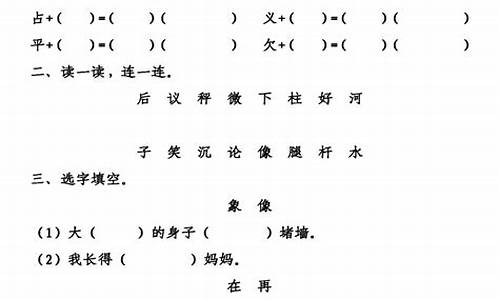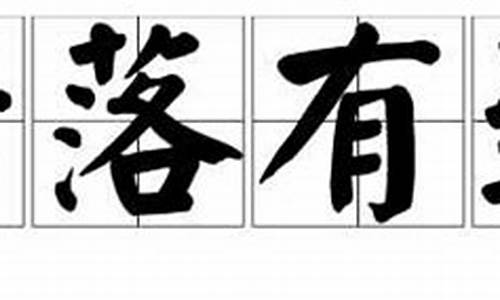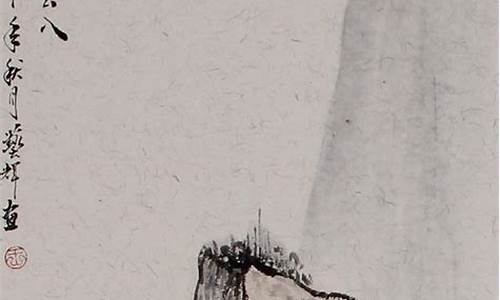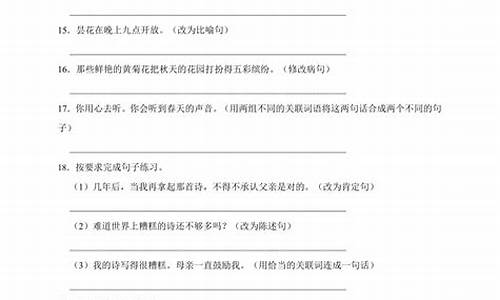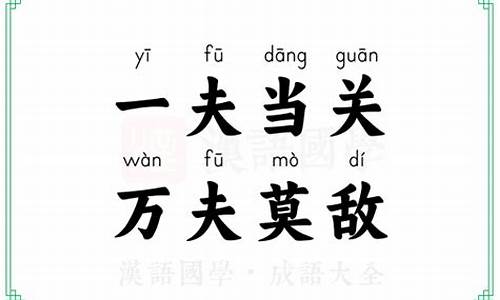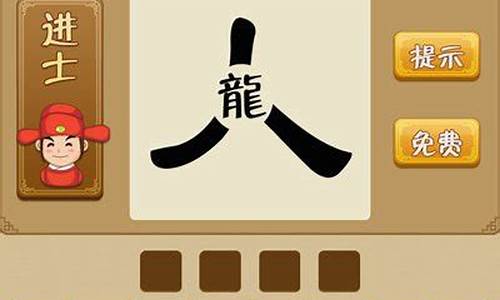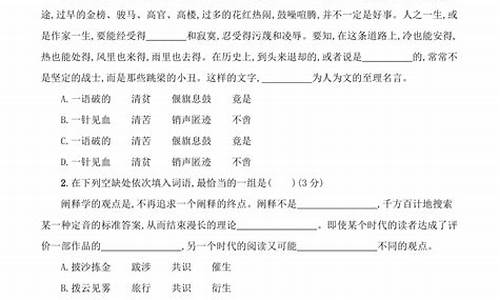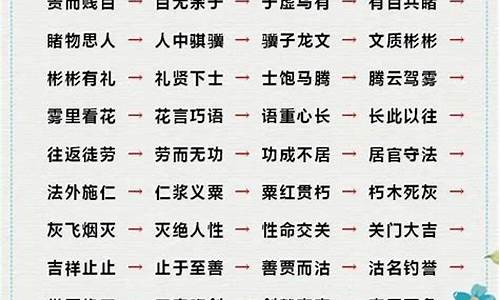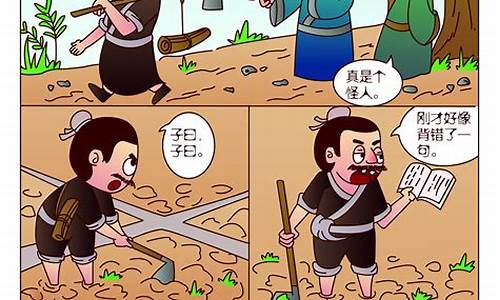allaybalam最老的歌曲_allay
1.英译《三十六计》 第一计:瞒天过海
2.alleviate relieve allay的区别 好像都有减少 减轻的意思
3.有哪些英文单词是以字母a开头,字母y结尾的呢
4.《我的世界》五种新生物是什么?
5.英语词尾 词根
6.mitigate和alleviate的区别

末尾有y的单词,发/i/音的单词有很多,比如hy、candy、many、windy、sunny、baby、sorry、family、party、study、hobby、funny、kindly、guilty、kitty、quickly、nicely等。
一、hy
1、读音:
英 [?hapi]
美 [?h?pi]
2、音译:
adj.愉快的;幸福的;滥用…的
3、例句:
Melissa came in looking?hy?and excited.
梅利莎进来时显得又高兴又激动。
二、baby
1、读音:
英?['be?bi]? ?
美?['be?bi]?
2、音译:
n.?婴儿;宝贝儿;孩子气的人
adj.?婴儿的;小型的
vt.?溺爱
3、例句:
She ge birth to a fine healthy baby.
她生了一个健康漂亮的婴儿。
三、many
1、读音:
英?['meni]? ? ?
美?['meni]?
2、音译:
adj.?许多的
pron.?许多人或物
n.?许多;许多人
3、例句:
How manybrothers do you he?
你有几个兄弟?
四、windy
1、读音:
英?['w?ndi]? ? ?
美?['w?ndi]?
2、音译:
adj.?有风的;多风的
3、例句:
It's windy today.
今天有风。
五、sunny
1、读音:
英?['s?ni]? ? ?
美?['s?ni]?
2、音译:
adj.?阳光充足的;晴朗的;明媚的;快活的
3、例句:
We basked ourselves on the sunny beach.
我们在阳光充足的海滩上晒太阳。
参考资料:
百度百科-hy
百度百科-many
百度百科-Windy
百度百科-SUNNY
百度百科-baby
英译《三十六计》 第一计:瞒天过海
Allan是英格兰人、苏格兰人的姓氏,是男子名,阿伦,Allen的变体。
名字的寓意:高贵的,重视重感情的人,万事和为贵。
名字的印象:喜欢社交,扎堆,讨厌寂寞。有时会腼腆,敏感但是很耐心。生活总是一成不变,不愿意尝试。喜欢稳定的,按部就班的环境。对技术领域有兴趣。没有自信,敏感。喜欢和别人合作。依赖别人。
扩展资料:
名字为Allan的名人:
埃德加·爱伦·坡(Edgar Allan Poe)(1809~1849),19世纪美国诗人、家和文学评论家,美国浪漫主义思潮时期的重要成员。
Edgar Allan Poe的作品的特点:
爱伦·坡的恐怖带有浪漫主义的特色。纵观爱伦·坡的恐怖创作,其故事主题大都“揭示了人类意识及潜意识中的阴暗面”,这一点显然迥异于同时代的其他浪漫主义作家。
爱伦·坡以恐怖这样一种特殊的文学形式深入刻画与呈现了非现实状态下人的精神状态和心理特征,试图“以非现实、非理性的表达方式来揭示现代人的精神因顿”。
他借助想象奇特、恐怖怪异的故事情节,通过夸张、隐喻和象征等修辞手段表现人性的危机,激起读者浓厚阅读兴趣的同时,震撼心灵,发人深省。
alleviate relieve allay的区别 好像都有减少 减轻的意思
三十六计(Thirty-Six Stratagem s )-第一计
瞒天过海 Fool the Emperor to Cross the Sea
原文 Content
备周则意怠;常见则不疑。阴在阳之内,不在阳之对。太阳,太阴。
英文注释: Moving about in the darkness and shadows
occupying isolated places
or hiding behind screens will only attract suspicious attention. To lower an enemy's guard you must act in the open hiding your true intentions under the guise of mon every day activities.
探源 Origin
英文:In 643 AD
Emperor Taizong of Tang baulked from crossing the sea to a campaign against Koguryo. His general Xue Rengui thought of a stratagem to get the emperor across and allay his fear of seasickness: on a clear day
the emperor was invited to meet a wise man. They entered through a dark tunnel into a hall where they feasted. After feasting several days
the Emperor heard the sound of wes and realized that he had been lured onto a ship! General Xue drew aside the curtains to reveal the ocean and confessed that they had already crossed the sea: Upon discovering this
the emperor decided to carry on and later pleted the successful campaign.(引用自维基百科(Wikipedia)英文版)
中文:公元643年,唐太宗大举攻打高句丽却因渡海而畏缩不前。旗下大将薛仁贵想出了一个计谋来克服皇帝的晕船恐惧症。在一个晴朗的日子里,唐太宗被邀请去见一位贤人。他们穿过一漆黑的地道到达一大厅之上并在那里大肆宴席。欢娱数日后,皇帝忽然听见波涛汹涌之声,愕然意识到自己竟被蒙骗上了船。这时薛将军揭开四周的帷幕,告诉大家他们正航行在大海之上,并已顺利地渡过了海。经过这件事情后,唐太宗决定继续战斗并最终取得了胜利。
词汇 Vocabularies
stratagem: 策略,计谋;和strategy不同,stratagem含有诡计,把戏的意味,而strategy则指单纯的战略,策略
suspicious: 猜疑的,多疑的
guise: 外表,伪装
baulk: 同balk
(遇见困难或不愉快的事)畏缩不前,犹豫
general: 此处指将军,上将
allay: 缓和,减轻
clear: 除了表示清楚的还可以表示(天气)晴朗的,这里是后一个意思
lure: 引诱,诱惑
confess: 坦白,承认
carry on: 继续做,坚持;注意如果carry和on中间多了一横,写作carry-on
就变成一个名词,表示大惊小怪,不得体的行为或随身携带的行李
总结 Summary
“瞒天过海”是一种欺骗的大智慧、大学问,讲究的就是一个欺骗的隐蔽性和无影无形性。隐蔽在那里?隐蔽在天天见的事物中!怎么个无影无形法?因为平常得让他不知不觉。(引用自韩冬著《玩转三十六计》)敬请期待下一计---围魏救赵!
有哪些英文单词是以字母a开头,字母y结尾的呢
1.Alleviate 指短暂的减轻压抑而没有解决其根源:“No arguments shall be wanting on my part that can alleviate so severe a misfortune” “对我来说要减轻如此严重的不幸,不需要任何争论”.2.Relieve 指缓解或...
《我的世界》五种新生物是什么?
简单的单词就不打意思了:angry,annoy,any,ly,away,anyway,allegory寓言,airy空气的,airway航线,alacrity敏捷,Albany纽约州州城,alimentary滋养的,allay使镇静,ally同盟国,already,alloy合金,Alley小巷,amity友好,amenity愉快,ambulance,ambiguity模棱两可,amazingly,amatory情人的,alternately轮流地,almighty万能的,alimony赡养费,alphabetically按字母表顺序,allopathy对抗疗法,ally同盟国,anatomy解剖,anchovy鱼类,annually每年,annuity养老金,amply,amnesty特赦,angularity生硬,animosity仇恨,anticipatory预期的,abbey修道院,arently明显地,anybody,apathy,apology,activity,actively,actually,academy,absently,absolutely,acidity酸味,accurately准确地,acclivity向上的陡坡,absurdly荒诞地,absurdity荒谬,abruptly突然地,abnormally反常,acerbity苦涩,admirably,adequately足够地,adequacy能力,actuality,activity,ly,awry走样的,awkwardly笨拙地,aliability有效性,eragely平均,iary鸟笼,audacity大胆,augury占卜,authenticity真实性,ascendency优势,ashy灰的,ashtry烟灰,ashutray烟灰缸,aually无性地,asperity粗鲁,assembly集合,assiduously勤奋地
英语词尾 词根
《我的世界》五种新生物是:猫鼬、白蚁、鸵鸟、青蛙、秃鹫/亡灵秃鹫。这些生物都是曾经通过社区投票而诞生的,且被Mojang所承诺加入。
与第一只新生物“怒目怪”Glare不同的是,“轻灵”Allay似乎只会被触发的音符盒所吸引出现,而非像是“光”这样模糊的东西。
生物特性:
猫鼬的特性:猫鼬将会是整个Minecraft昆虫天然的敌人,诞生于沙漠之中。预测未来它的食物链下层将会是蠹虫、蜘蛛、白蚁、鸟类、蛋类等等。
白蚁的特性:在热带的大草原,白蚁会选择居住在木头多的地方。例如你的木制房屋、你所在的村庄。它们会破坏这些木头。但白蚁数量众多、且体积极小。玩家用剑几乎不可能杀死它们,所以你需要借助猫鼬的力量来除去白蚁。
鸵鸟特性:鸵鸟异常的高大,甚至会比马还要高,属卵生。鸵鸟蛋会不会比鸡蛋用处更大在非洲的文化里,有一种用鸵鸟赛车的习俗。
mitigate和alleviate的区别
1.常见的词根
常见的词根
1) aer, ar, 含义是“空气,大气” aeroplane, aerial,
2) ag, act, ig, 含义是“做,动作” active, agent, reaction,
3) alt, 含义是“高”, altitude,
4) alter, altern, altr, 含义是“其它,变更” alternate,
5) bio, bi, bion, 含义是“生物,生命” biology, bionics(仿生学)
6) brev, bri, brief, 含义是“短” brief, abbreviation, abridge(节略)
7) cap, capt, cept, cip, 含义是“取,获” capture, except, concept, capacity
8) ced, ceed, cess, 含义是“行,让步” proceed, succeed, excess(过度)
9) centr, centr, 含义是“中心” concentrate, eccentric(偏心的)
10) clain, clam, 含义是“呼喊” claim, proclaim, exclaim
11) clos, clud, 含义是“闭合” conclude, enclose, include
12) col, cult, 含义是“耕耘” colony, cultivate, agriculture
13) cor, cord, 含义是“心” cordial, record, accord
14) curr, cur, cour, 含义是“跑,动作” current, occur, concurrence(同时发生)
15) dic, dict, 含义是“说,示” dictate, edit, indicate, predict
16) doc, doct, 含义是“教” doctor, document.nbsp
17) duc, duct含义是“引导,传导” introduce, produce, conduct, deduct( 推论)
18) fact, fac, fect, dic, dit, 含义是“做,创造” factory, effect, profit, faculty, perfect
19) fend, fens, 含义是“打,击” defence, offence
20) fer, 含义是“搬运,移转” ferry, transfer, defer(迟延)
21) fin, finit, 含义是“终,极” final, finish, confine
22) firm, 含义是“坚固” firm, confirm, affirm(断定)
23) fix, 含义是“固定” prefix, affix(附加)
24) flect, flex, 含义是“弯曲” flexible, reflex
25) flor, flour, flower, 含义是“花” flower, flourish
26) form, 含义是“形” uniform, formula, transform, reform, deform
27) forc, fort, 含义是“力,强度” force, enforce, effort
28) gen, genit, 含义是“生产,发生” generate, generation
29) gram, graph, 含义是“书写,记录” telegram, diagram, photograph
30) grad, gress, gred, gree, 含义是“步,阶段” gradually, degree, progress
31) hab, habit, hibit, 含义是“保持,住” inhabit, exhibit, prohibit
32) her, hes, 含义是“粘附” adhere, cohesion
33) ject, jet, 含义是“抛射” project, inject
34) jour, 含义是“日,一天” journal(日记), journey, adjourn(延期)
35) jug, junct, 含义是“结合,连合” conjunction, junction(连合)
36) labour, labor, 含义是“劳动,工作” labourer, elaborate, collaborate
37) lect, leg, lig, 含义是“挑选,集” collect, select, lecture
38) lif, liv, 含义是“生活,生存” life, alive, live
39) loc, 含义是“场所,位置” location, dislocate(脱位)
40) long, leng, ling, 含义是“长的” length, prolong, linger
41) loqu, locut, 含义是“说话” colloquial, eloquent,
42) mand, mend, 含义是“命令” command, demand, recommend
43) man, manu, 含义是“手,手法” manage, manual
44) memor, menber, 含义是“记忆” memory, remember, memorial
45) mind, ment, 含义是“心” mind, remind, mental
46) merc, merch, 含义是“贸易” commerce, merchant
47) meas, mens, meter, metr, 含义是“测量,度量” measure, meter, diameter
48) min, 含义是“小” diminish, minority
49) miss, mit, 含义是“派遣,送” mission, dismiss, transmit, missile
50) mob, mot, mov, 含义是“动” movement, motion, mobile, remove
51) nect, nex, 含义是“捆扎” connect, disconnect, annex(合并)
52) not, 含义是“记号,注意” note, denote, annotation(注释)
53) onom, onym, 含义是“名字” synonym, antonym, anonymous
54) pair, par, 含义是“a)相同,对等b)准备” compare, prepare
55) pel, puls, 含义是“追逐” expel, impel(推进)
56) pend, pens, pond, 含义是“悬挂” depend, independent, expense(支付)
57) phon, 含义是“声音” symphony, telephone, microphone
58) plac, 含义是“位置,场所” place, replace
59) peopl, popul, publ, 含义是“人民,民众” public, republic, popular, people
60) port, 含义是“搬运” export, import, deport(输送)
61) press, 含义是“压,压制” pressure, express, oppress, impression
62) prob, proof, prov, 含义是“实验,验证” prove, rove,
63) quer, quest, quir, quis, 含义是“寻找,探问” inquiry, question, inquisition(调查,追究)
64) rang, rank, 含义是“排列” arrange, rank,
65) rect, right, rig, 含义是“正,直” correct, direct, erect
66) riv, 含义是“河流,流远”,river, arrive, derive
67) rupt, 含义是“破坏,毁坏” eruption, bankrupt, corruption
68) sci, 含义是“认识,知识” science, conscious
69) scrib, script, 含义是“书写,记录” describe, script
70) sens, sent, 含义是“感觉,情感” sensation, sentiment
71) sign, 含义是“标记,符号” signal, signature, design
72) sembl, simil, 含义是“相似,类似” similar, resemble, assimilate(同化)
73) soci, 含义是“结合,社交” social, association
74) spec, spect, spitc, spis, 含义是“看,视” inspect, spectator, conspicuous, respect
75) struct, 含义是“建筑,构造” structure, construct, instruct, destruction
76) tect, teg, 含义是“遮蔽,掩盖” detect, protect
77) temp, tens, 含义是“时间,时机” tense, contemporary, temporal
78) tend, tes, tent, 含义是“倾向, 伸张” tendency, intension, extend, intend
79) test, 含义是“证明,证实” testify, protest, contest(争论)
80) text, 含义是“编织, 构成” textile, texture, context
81) tract, trail, 含义是“拖拉,吸引” attract, tractor, abstract, contract(收缩)
82) tribut, 含义是“给予” contribution, distribute
83) us, ut, 含义是“用,使用” usable, utilize, abuse
84) vac, van, 含义是“空,虚” vacancy, vanity, evacuate(清空)
85) vad, vas, wad, 含义是“走,去” invade, wade, evade(逃避)
86) vers, vert, 含义是“旋转,反转” convert, inversion(倒转), reverse, divert(使转向)
87) vid, vis, vey, view, 含义是“观看,看见” television, visible, evident, interview, survey
88) viv, vit, 含义是“生,活” vivid, vital, survival,
89) war, ward, 含义是“注意,保护” aware, wary(谨慎), ward(守护)
90) way, 含义是“路” way, away, subway, always
一. 常见的前缀
1.表示否定意义的前缀
1)纯否定前缀
a-, an-, asymmetry(不对称)anhydrous(无水的)
dis- dishonest, dislike
in-, ig-, il, im, ir, incapable, inability, ignoble, impossible, immoral, illegal, irregular
ne-, n-, none, neither, never
non-, noesense
neg-, neglect
un- unable, unemployment
2)表示错误的意义
male-, mal-, malfunction, maladjustment(失调)
mis-, mistake, mislead
pseudo-, pseudonym(名), pseudoscience
3)表示作的意思
de-, defend, demodulation(解调)
dis-, disarm, disconnect
un-, unload, uncover
4)表示相反,相互对立意思
anti-, ant- antiknock( 防震), antiforeign,(排外的)
contra-, contre-, contro-, contradiction, controflow(逆流)
counter-, counterreaction, counterbalance
ob-, oc-, of-, op-, object, oppose, occupy
with-, withdraw, withstand
2. 表示空间位置,方向关系的前缀
1)a- 表示“在……之上”,“向……”
aboard, aside,
2)by- 表示“附近,邻近,边侧”
bypath, bypass(弯路)
3)circum-, circu-, 表示“周围,环绕,回转”
circumstance, circuit
4)de-, 表示“在下,向下”
descend, degrade
5)en-, 表示“在内,进入”
encage, enbed(上床)
6)ex-, ec-, es-, 表示“外部,外”
exit, eclipse, expand, export
7)extra-, 表示“额外”
extraction (提取)
8)fore- 表示“在前面”
forehead, foreground
9)in-, il-, im-, ir-, 表示“向内,在内,背于”
inland, invade, inside, import
10)inter-, intel-, 表示“在……间,相互”
international, interaction, internet
11)intro-, 表示“向内,在内,内侧”
introduce, introduce
12)medi-, med-, mid-, 表示“中,中间”
Mediterranean, midposition
13)out-, 表示“在上面,在外部,在外”
outline, outside, outward
14)over-, 表示“在上面,在外部,向上”
overlook, overhead, overboard
15)post-, 表示"向后,在后边,次”
postscript(附言),
16)pre-, 表示"在前”在前面”
prefix, preface, preposition
17)pro-, 表示“在前,向前”
progress, proceed,
18)sub-, suc-, suf-, sug-, sum-, sup-, sur-, sus-, 表示“在下面,下”
subway, submarine, suffix, suppress, supplement
19)super-, sur-, 表示“在…..之上”
superficial, surface, superstructure
20)trans-, 表示“移上,转上,在那一边”
translate, transform, transoceanic
21)under-, 表示“在…..下面,下的”
underline, underground, underwater
22)up-, 表示“向上,向上面,在上”
upward, uphold, uphill(上坡)
3. 表示时间,序列关系的前缀
1)ante-, anti-, 表示“先前,早于,预先”
antecedent, anticipate,
2)ex-, 表示“先,故,旧”
expresident, exhusband
3)fore-, 表示“在前面,先前,前面”
foreward, dorecast, foretell(预言)
4)mid-, medi-, 表示“中,中间”
midnight, midsummer
5)post-"表示“在后,后”
postwar,
6)pre-, pri-, 表示“在前,事先,预先”
preheat, prewar, prehistory
7)pro-, 表示“在前,先,前”
prologue(序幕),prophet(预言家)
8)re-, 表示“再一次,重新”
retell, rewrite
4. 表示比较程度差别关系的前缀
1)by-, 表示“副,次要的”
byproduct, bywork(副业)
2)extra-,表示“超越,额外”
extraordinary,
3)hyper- 表示“超过,极度”
hypersonic(超声波), hypertesion(高血压)
4)out-,表示“超过,过分”
outdo(超过), outbid(出价过高的人)
5)over-,表示“超过,过度,太”
overeat, overdress, oversleep
6) sub-, suc-, sur-, 表示“低,次,副,亚”
subeditor, subordinate, suropical(亚热带)
7)super-, sur- 表示“超过”
supernature, superpower, surplus, surpass
8)under-,表示“低劣,低下”
undersize, undergrown, underproduction(生产不足)
9)vice- 表示“副,次”
vicepresident, vicechairman
5. 表示共同,相等意思的前缀
1)com-, cop-, con-, cor-, co- 表示“共同,一起”。
connect, combine, collect, combat, coexist, co-operate
2)syn-, syl-,sym-,表示“同,共,和,类”
symmetry, sympathy, synthesis(合成)
6. 表示整个完全意思的前缀
1)al- 表示“完整,完全”alone, almost,
2) over-表示“完全,全”overall, overflow(充满)
3) pan-表示“全,总,万”panentheism(泛神论),panorama
7. 表示分离,离开意思的前缀
1)a- ab-, abs-,表示“分离,离开” away, apart, abstract, abstain
2)de- 表示“离去,处去”depart, decolour,
3)dis-, di-, dif-, 表示“分离,离开” divorce, disarm(缴械)
4)ex-, e-, 表示“离开,分离”expel, exclude, expatriate(驱出国外)
5)for- 表示“离开,脱离”forget, forgive
6)表示“离开”release, resolve
7)表示“分离,隔离”separate, seduce, select
8. 表示通过,遍及意思的前缀
1)dia-,表示“通过,横过”diameter, diagram,
2)per-, pel-, 表示“通,总,遍”perfect, perform, pervade(浸透)
3)trans-, 表示“横过,贯通”transparent, transmit, transport
9. 表示加强意思的前缀
a-, arouse, ashamed
ad-, adjoin, adhere( 粘着)
10. 表示变换词类作用的前缀
be-, befriend,
en-, ensle, enable, enrich
ad-, ac-, af-, ag-, an-, ap-, ar-, as-, at-, adapt, accord, affix, aggression, arrive, assist, attend, attract, arrange, assign(委派)
11. 表示数量关系的前缀
1)表示“单一”,“一”
mon-, mon-, monotone(单调),monopoly, monarch
uni-, un-, uniform, unicellular(单细胞)
2)表示“二,两,双”
ambi-, ambiguous, amphibian(两栖类)
bi-, bin- bicycle, di-, diode(二级管),
twi-, twilight
3)表示“十”deca, deco-, dec- deci-, decade, decimals
4)表示"百,百分子一"
hecto-, hect-, hectometer,
centi-, centimeter
5)表示"千,千分子一” kilo-, kilometer
6)表示"万,万分子一”
myria-, myri-, myriametre
mega-, meg-, megabyte
micro-, microvolt (微伏特)
7)表示"许多,复,多数”
multi-, mult-, multipmetre (万用表)
poly-, polysyllable,
8)表示“半,一半”
hemi-, hemisphere
demi-, demiofficial
semi-, semiconductor, semitransparent
pene-, pen-, peninsula
12. 表示特殊意义的前缀
1)arch-, 表示“首位,第一的,主要的”architect, archbishop
2)auto-, 表示“自己,独立,自动”automobile, autobiography
3)bene-, 表示“善,福”benefit
4)eu-, 表示“优,美好”eugenics(优生学),euphemism
5)male-, mal- 表示“恶,不良”maltreatment, malodor,
6)macro-, 表示“大,宏大”macroscopic(宏观)
7)magni-, 表示“大”magnificent
8)micro-, 表示“微”microscope
13. 表示术语的前缀
1)aud-, 表示“听,声”audience,
2)bio-, 表示“生命,生物”biography(传记)
3)ge-, 表示“地球,大地”geography
4)phon-, 表示“声,音调”phonograph
5)tele-, 表示“远离”television, telephone <!--IBF.ATTACHMENT_245298-->
二. 常见的后缀
1. 名词后缀
(1) 具有某种职业或动作的人
1)-an, -ain, 表示"……地方的人,精通……的人”American, historian,
2)-al, 表示"具有……职务的人" principal,
3)-ant,-ent, 表示"……者” merchant, agent, servant, student,
4)-ar, 表示"……的人” scholar, liar, peddler
5)-ard, -art, 表示"做……的人”coward, laggard, braggart(夸张者)
6)-arian, 表示"……派别的人, ……主义的人”humanitarian, vegetarian
7)-ary, 表示"从事……的人" secretary, missionary
8)-ant, 表示"具有……职责的人" candidate, graduate
9)-ator, 表示"做……的人" educator, speculator(投机者)
10)-crat, 表示"某种政体,主义的支持者" democrat, bureaucrat
11)-ee, 表示"动作承受者" employee, examinee
12)-eer, 表示"从事于……人" engineer, volunteer
13)-er, 表示"从事某种职业的人, 某地区,地方的人" banker, observer, Londoner, villager
14)-ese, 表示" ……国人,…..地方的人”Japanese, Cantonese
15)-ess, 表示"阴性人称名词, actress, hostess, manageress
16)-eur, 表示"……家” amateur, littérateur
17)-ian, 表示"……地方人,信仰…….教的人,从事……职业的人”Christian, physician(内科医生),musician
18)-ician, 表示"精通者, ……家,”electrician, magician, technician
19)-icist, 表示"……家, …….者, …….能手”physicist, phoneticist, technicist
20)-ic, 表示"……者,……师" mechanic, critic
21)-ie, 表示"爱,指小" dearie, auntie, lassie(小姑娘)
22)-ier, 表示"从事……职业” calier, clothier, brazier(黄铜匠)
23)-ine, ian, 表示"阴性人称" e, ballerina
24)-ist, 表示"从事……研究者,信仰……主义者" pianist, communist, dentist, artist, chemist
25)-ive, 表示"动作者,行为者” native, captive
26)-logist, 表示"……学家,研究者" biologist, geologist(地质学家)
27)-or, 表示"……者" author, doctor, operator,
28)-ster, 表示"做…….事情的人”youngster, gamester(赌徒),songster
29)-yer, 表示" 从事……职业者” lawyer
(2). 构成,具有抽象名词的含义1)-acy, 表示"性质,状态,境遇" accuracy, diplomacy
2)-age, 表示"状态,行为,身份及其结果,总称" courage, storage, marriage
3)-al, a) 表示"事物的动作,过程”refusal, arrival, survival, denial, roval
<!--emo&B)--><!--endemo--> 表示具体的事物manual, signal, editorial, journal
4)-ance, -ence表示"性质,状况,行为,过程,总量,程度” endurance, importance, diligence, difference, obedience
5)-ancy, -ency, 表示"性质,状态,行为,过程" frequency, urgency, efficiency,
6)-bility, 表示"动作,性质,状态" possibility, feasibility,
7)-craft, 表示"工艺,技巧” woodcraft, handicraft, statecraft(治国策)
8)-cracy, 表示"统治,支配" bureaucracy, democracy
9)-cy, 表示"性质,状态,职位,级别" bankruptcy(破产),supremacy
10)-dom, 表示"等级,领域,状态" freedom, kingdom, wisdom
11)-ery, -ry, 表示"行为,状态,习性" brery, bribery, rivalry
12)-ety, 表示"性质,状态” variety, dubiety(怀疑)
13)-faction, -facture, 表示"作成,……化,作用" satisfaction, manufacture
14)-hood, 表示"资格,身份, 年纪,状态" childhood, manhood, falsehood
15)-ice, 表示"行为,性质,状态" notice, justice, service
16)-ine, 表示"带有抽象概念" medicine, discipline, famine
17)-ing, 表示"动作的过程,结果" building, writing, learning
18)-ion, -sion, -tion, -ation, -ition, 表示"行为的过程,结果,状况" action, solution, conclusion, destruction, expression, correction
19)-ise, 表示"性质,状态” exercise, merchandise(商业)
20)-ism, 表示"制度,主义,学说,信仰,行为" socialism, criticism, colloquialism, heroism
21)-ity, 表示"性质,状态,程度” purity, reality, ability, calamity
22)-ment, 表示"行为,状态,过程,手段及其结果 treatment, movement, judgment, punishment, argument
23)-mony, 表示"动作的结果,状态" ceremony, testimony
24)-ness, 表示"性质,状态,程度" goodness, kindness, tiredness, friendliness
25)-or, -our, 表示"动作,性质,状态" for, error,
26)-osity, 表示"动作,状态” curiosity
27)-ship, 表示"情况,性质,技巧,技能及身份,职业” hardship, membership, friendship
28)-th, 表示"动作,性质,过程,状态" depth, wealth, truth, length, growth
29)-tude, 表示"性质,状态,程度" latitude, altitude(海拔)
30)-ure, 表示"行为,结果" exposure, pressure, failure, procedure(手续),
31)-y, 表示"行为的结果,状态,性质” glory, history, victory, inquiry
(3) 带有场所,地方的含义
1)-age, 表示"住所,地点" village, cottage
2)-ary, 表示"住所,场地" library, granary (谷仓)
3)-ery, ry, 表示"工作场所,饲养所,地点" laundry, nursery, surgery(手术室)
4)-ory, 表示"工作场所,住处" factory, dormitory, laboratory, observatory
(4) 带有学术,科技含义
1)-grapy, 表示"……学,写法” biography, calligraphy, geography
2)-ic, ics, 表示"……学……法" logic, mechanics, optics, electronics
3)-ology, 表示"……学……论”biology, zoology, technology(工艺学)
4)-nomy, 表示"……学……术" astronomy, economy, bionomy(生态学)
5)-ery, 表示"学科,技术" chemistry, cookery, machinery
6)-y, 表示"……学,术,法” photography, philosophy
(5) 表示人和事物的总和,集合含义
1)-age, baggage, tonnage
2)-dom, newspaperdom(新闻界)
3)-hood, neighbourhood, womanhood
4)-ery, calry, ministry(内阁)
5)-ure, legislature, judicature
(6) 表示物品和物质名称的含义
1)-ant, ent, solvent, constant
2)-al, signal, pictorial(画报)
3)ar, collar, pillar(石柱)
4)- er, boiler, computer, washer, cooker
5)-ery, drapery(绸缎)
6)-ing, clothing, matting,
7)-ment, instrument, equipment, attachment
(7) 表示“细小”的含义
1)-cle, particle,
2)-cule, molecule(分子)
3)-el, parcel
4)-en, chicken, maiden
5)-et, pocket, ticket
6)-etta, -ette, etto, cigarette, essayette(短文)
7)-kin, napkin
8)-ling, duckling,
9)-let, booklet
10)-y, baby, doggy
2. 形容词后缀
(1)带有“属性,倾向,相关”的含义
1)-able, -ible, movable, comfortable, licable, visible, responsible
2)-al, natural, additional, educational
3)-an, ane, urban, suburban, republican
4)-ant, -ent, distant, important, excellent
5)-ar, similar, popular, regular
6)-ary, military, voluntary
7)-ice, -atie, ical, politic, systematic, historic, physical,
8)-ine, masculine, feminine, marine
9)-ing, moving, touching, daring
10)-ish, foolish, bookish, selfish
11)-ive, active, impressive, decisive
12)-ory, satisfactory, compulsory
13)-il, -ile, -eel, fragile, genteel(文雅的)
(2) 表示“相象,类似”的含义
1)-ish, boyish, childish
2)-esque, picturesque
3)-like, manlike, childlike
4)-ly, manly, fatherly, scholarly, motherly
5)-some, troublesome, handsome
6)-y, milky, pasty
(3) 表示“充分的”含义
1)-ful, beautiful, wonderful, helpful, truthful
2)-ous, dangerous, generous, courageous, various
3)-ent, violent,
(4) 表示由某种物质形成,制成或生产的含义
1)-en, wooden, golden, woolen
2)-ous, gaseous
3)-fic, scientific
(5) 表示方向的含义
1)-ern, eastern, western
2)-ward, downward, forward
(6) 表示“倍数”的含义
1)-ble, double, treble
2)ple, triple
3)-fold, twofold, tenfold
(7) 表示“数量关系”的含义
1)-, thir
2)-ty, fifty
3)-th, fourth, fiftieth
(8) 表示国籍,语种,宗教的含义
1)-an, Roman, European
2)-ese, Chinese,
3)-ish, English, Spanish
(9) 表示“比较程度”的含义
1)-er, greater
2)-ish, reddish, yellowish
3)-est, highest
4)-most, foremost, topmost
(10)其他的含义
-less, 表示否定,countless, stainless, wireless
3. 动词后缀
1)-ize, ise, 表示"做成,变成,……化“modernize, mechanize, democratize, organize
2)-en, 表示"使成为,引起,使有” quicken, weaken, soften, harden
3)-fy, 表示"使……化, 使成”beautify, purify, intensify, signify, simplify
4)-ish, 表示"使,令” finish, abolish, diminish, establish
5)-ate, 表示“成为……,处理,作用” separate, operate, indicate
4. 副词后缀
1)-ly, possibly, swiftly, simply
2)-ward, -wards, downward, inwards, upward
3)-ways, always, sideways
4)-wise, otherwise, clockwise <!--IBF.ATTACHMENT_245302-->
mitigate和alleviate的区别为:指代不同、用法不同、侧重点不同
一、指代不同
1、mitigate:减轻,缓和。
2、alleviate:缓解。
二、用法不同
1、mitigate:第三人称单数,mitigates、现在分词,mitigating、过去式,mitigated、过去分词,mitigated、(使)缓和,缓和下来。
2、alleviate:alleviate强调暂时或部分地缓解,专指平息或缓和怒气等强烈的情绪,可指把痛苦减轻到可以忍受的程度。
三、侧重点不同
1、mitigate:减轻的是比较中性的事物。
2、alleviate:是减轻或缓和不好的东西。
声明:本站所有文章资源内容,如无特殊说明或标注,均为采集网络资源。如若本站内容侵犯了原著者的合法权益,可联系本站删除。

